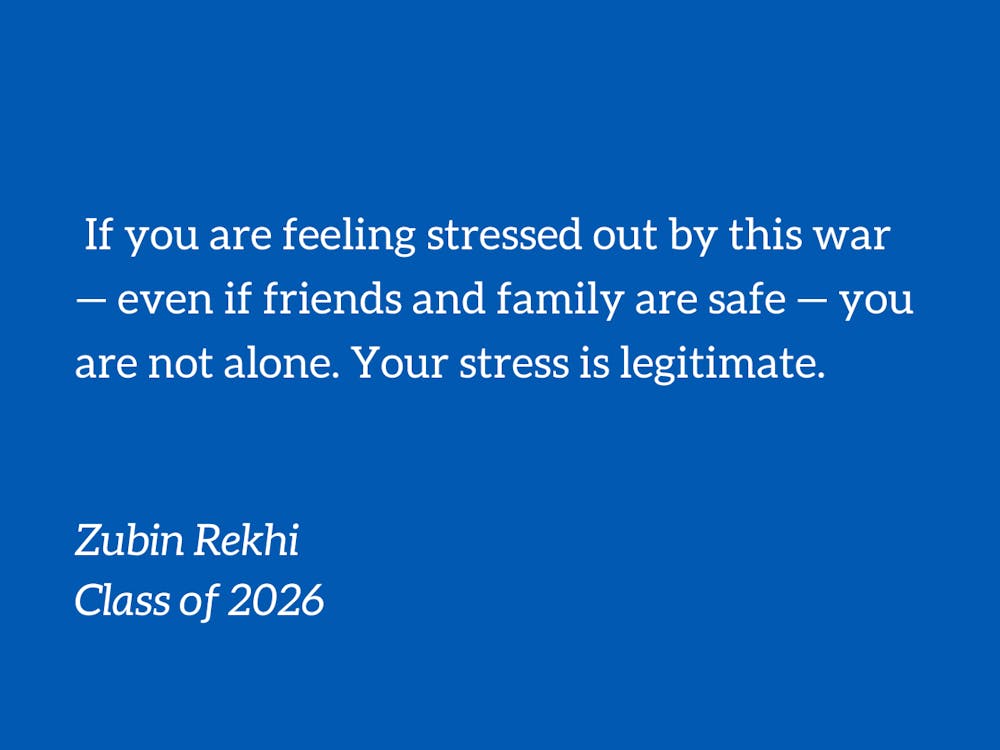In light of the Israel-Gaza war, I wanted to digress from my typical discussion of Duke-specific social issues to focus on how we can take care of ourselves in light of the constant barrage of headlines keeping our minds on edge.
If, like me, you are addicted to searching for the latest update on your phone, this war can feel overwhelming and tiring. We have dealt with war in Ukraine last year, and we have a Presidential election looming next year. And especially if you have family impacted by the war, it can feel like an obligation to remain well-apprised of every new event taking place. If you are generally politically active or just have strong views about this war, you might also feel obligated to read every article or peruse every politically oriented social media post. Amidst accusations of fake news and deep-seated political biases, it can be exhausting to constantly think about the war. Yet, at the same time, it is impossible not to.
I’m here to tell you that it’s fine to not watch news footage or read another New York Times article about the war.
Stepping back is taking care of yourself. Making a false tradeoff between neglecting your mental health and somehow neglecting war victims — even if they are close family members — by choosing not to read the latest headline is unsustainable.
Some people will say that my advice amounts to sticking your head in the sand because ignorance is bliss. They might think that it plays into the evil narrative and misinformation serving as the original intent behind the attacks and detracts from justice. That’s why, they suggest, it’s important for even children to see gut-wrenching photos: to know the scale of depravity that occurred and say never again instead of repeating the mistakes of their predecessors.
I agree that eventually, we should all process what has just happened because too often our memories have lapsed at critical junctures and we have repeated the same mistakes time and again in history. But it’s okay to digest this war at your own pace and to do so when you are ready, not when a pushy news commentator says so.
And if you are feeling stressed out by this war — even if friends and family are safe — you are not alone. Your stress is legitimate.
Breaking news-fueled stress is relatively commonplace in America. The American Psychological Association defines “headline stress” as negative news coverage harming one’s mental and physical health through “intrusive thoughts about news articles or current events throughout the day” and “persistent anger, resentment, or anxiety generated by reading news articles.” At the core of “headline stress” lies an individual’s powerlessness about the distressing situation that affects them but that they cannot control.
You probably feel stressed knowing that you have no power over the actions of Hamas or the Israeli government. It’s the feeling that all you can do is sit back and watch and hear horror stories that gets you addicted to the news apps and platforms on your phone.
But putting down your phone helps. The American Psychological Association also points out that turning off news notifications on your phone or setting a timer to limit upsetting social media content helps. If you feel powerless, channeling your time and effort away from your news feed and into a positive action — such as donating or raising money for a cause you care about adjacent to the war — can help.
Being able to say “I can’t” when you scroll through family group chats full of clickbait or news platforms is not only okay but also good for you. Moving at your own pace is your right. Moving at someone else’s is not an obligation worth stress about fulfilling.
Zubin Rekhi is a Trinity sophomore. His column typically runs on alternate Fridays.
Get The Chronicle straight to your inbox
Signup for our weekly newsletter. Cancel at any time.

